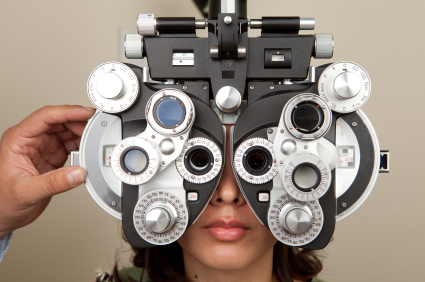Are You a Candidate for LASIK?
-

LASIK is the most popular refractive surgery for people looking to ditch their glasses or contacts and improve their vision. The FDA reports that more than 600,000 people have LASIK every year, with most achieving 20/20 vision or better. There are variants to the 15-minute procedure, but the goal of all LASIK procedures is the same: to reshape the eye’s cornea to address refractive errors like nearsightedness, farsightedness and astigmatism.
Are you a LASIK candidate? Millions of people have opted for some form of LASIK (traditional, wavefront guided, all-laser) with positive results, but the laser eye surgery is not for everyone. Here are nine factors that might impact your eligibility:
-
1. Age

LASIK is not recommended for people under the age of 18. The reason? The eyes may still be developing into early adulthood, so any sort of refractive correction before then could be shortsighted. Many eye doctors suggest waiting until you’re 21 or older to have LASIK. However, if you wait too long you might encounter additional issues. Sometime after age 40, the eyes begin to change again. Conditions such as presbyopia and, further down the road, cataracts, become a consideration.
Most LASIK patients fall between the ages of 20 and 40.
-
2. Pregnancy or Nursing

Women who are pregnant or nursing are not candidates for LASIK surgery. The hormones associated with both can cause vision instability, so women are advised to hold off for a minimum of three menstrual cycles after nursing has been discontinued before seeking refractive surgery.
-
3. Dry Eye Syndrome

If you suffer from chronic dry eye, LASIK surgery could end up worsening the condition. Dry eye after LASIK is a common side effect, affecting more than 50 percent of patients.
-
4. Eye Health

If you have an underlying eye condition, you probably are ineligible for LASIK. Common eye conditions like keratoconus, cataracts, glaucoma, etc. are inhibitive factors when it comes to LASIK. Part of the LASIK consultation will include a thorough evaluation of eye health and medical history to ensure that you are a fit for the procedure.
-
5. General Health

Beyond eye health, there are general health considerations that may impact LASIK candidacy. Serious conditions like autoimmune disorders and diabetes will likely rule you out as a candidate. Similarly, any condition that could inhibit proper healing might affect eligibility. Additional concerns that may not rule you out as a candidate, but should be discussed with your eye doctor include back problems, claustrophobia and mental health issues.
-
6. Contacts

Contact lens wearers will need to discontinue use for a specified amount of time before they can be considered for LASIK surgery. The specific amount of time is determined on a case-by-case basis by an eye doctor. The goal is to allow for corneal stability and a more precise prescription assessment.
-
7. Unstable Vision

Refractive instability, like a change in your contact lens or glasses prescription, can affect your eligibility for surgeries like LASIK. Age is another form of instability for those under 18 or over 40. Certain medications may cause vision instability. Antihistamines can cause dry eye, and other drugs (like Flomax) have been linked with corneal disorders. Your eye doctor will look for a solid year of vision stability before LASIK candidacy is confirmed.
-
8. Previous Refractive Surgery

If you have already undergone one or more refractive surgeries, you may not be considered an ideal candidate for LASIK. A thorough evaluation of patient history and eye health will be required, but the risks may outweigh the benefits in the end.
-
9. Eye Anatomy

Anatomical deficiencies could rule you out of LASIK candidacy. For example, if your corneas are too thin, the risk of complications could be too high. Patients with large pupils may also experience complications with LASIK, including double vision, halos and glare.
-
Not a Candidate? There are Alternatives

If you are deemed ineligible for LASIK surgery, there are other vision correction options that may be a better fit. PRK, LASEK, conductive keratoplasty (CK), phakic intraocular lenses and refractive lens exchange (RLE) are but a few of the refractive procedures that may help to improve your vision. Click on the links below to learn more about these alternatives to LASIK.


